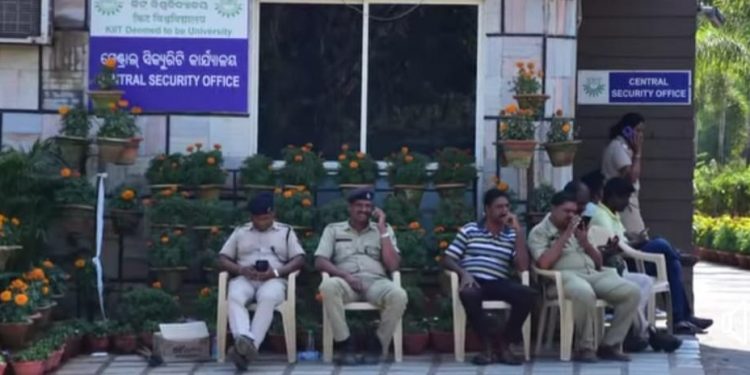Bhubaneswar: The unrest that broke out on the campus of Kalinga Institute of Industrial Technology (KIIT) following the alleged suicide of a 20-year-old BTech student from Nepal and the forcible eviction of hundreds of justice-seeking students from hostels after subjecting them to inhuman brutality at the hands of university guards and bouncers has raised several questions on the role of the police whose absence was conspicuous.
While the men and women in khaki whose mistreatment of citizens brought shame to the state last year in the Bharatpur police station episode that is still being investigated, the alleged mishandling of the events at KIIT has not only damaged the reputation of Odisha’s pride as the education hub of eastern India, but also jeopardised relations with the Himalayan country. As if the police’ absence from the scene of violence at KIIT was not enough, viral videos surfacing on social media that showed many of them at railway stations instructing evicted students to go back to the campus raises questions about their integrity which needs to be investigated, said lawyers and social activists. The lid over the suicide blew off February 16 after Siddhanth Sigdel, a cousin brother of the deceased, Prakriti Lamsal, lodged a complaint at the Infocity police station, alleging that she took the extreme step following protracted harassment by a fellow student Advik Srivastav, who was subsequently arrested following wide-spread outcry.
As per the reports, tensions flared up on the campus after news of her death spread, with students—particularly from Nepal — staging demonstrations and demanding justice. But instead of helping the overseas students, the authorities acted by declaring sine die and allegedly used force in evicting them from their hostels. They were packed in the institute’s buses in hordes and dropped at railway stations. Some students, who wished not to be identified, alleged that a woman constable aided their forced eviction along with institute’s security personnel. “Instead of bringing the culprit to justice, the police were more interested in forcing students to vacate hostels. It seems for them (police) what matters is to stay on the side of the powerful than finding the culprit,” they alleged. Activists and lawyers questioned why police were aiding the university authorities in perpetrating violence on the students rather than controlling the situation. Bibhuti Bhusan Mohapatra, convenor of Students Against Corruption, said, “On whose orders did the police go to the hostels and railway stations to vacate and call back the Nepalese students? Did they get their salary from KIIT, or from the government? Why were the Nepalese students beaten up after the body of the student was discovered?” Another activist and netizen, Sann, said, “The Odisha Police arrested five university staffers – three directors and two security guards. But why were the two female university officials who made racist slurs harming India-Nepal relations were allowed to go scot free?”
Also Read: Missing company VP, his driver return home
Moreover, the quick bail to the university staffers – arrested by Infocity police in connection with the brutal assault on the varsity students – by a local court, has sparked discussions over the alleged police bias. Senior advocate Chittaranjan Dash said that a probe should be ordered to find out if the police were also involved in the beating up of the students instead of protecting them. He alleged that the police deliberately applied ‘lighter’ sections in order to ensure quick bail to the accused. “They should rather have charged them under Sections pertaining to the attempt to murder and kidnapping,” he said. Meanwhile, when queried over the alleged police inaction, Infocity police station IIC Mahendra Kumar Sahu denied of any involvement of police in the beating up of the students. “We have arrested the culprit, Advik Srivastav, immediately. What happened at the hostel is not in our hands. It can be probed,” he said, while avoiding a direct question about their mishandling of the entire situation.







































